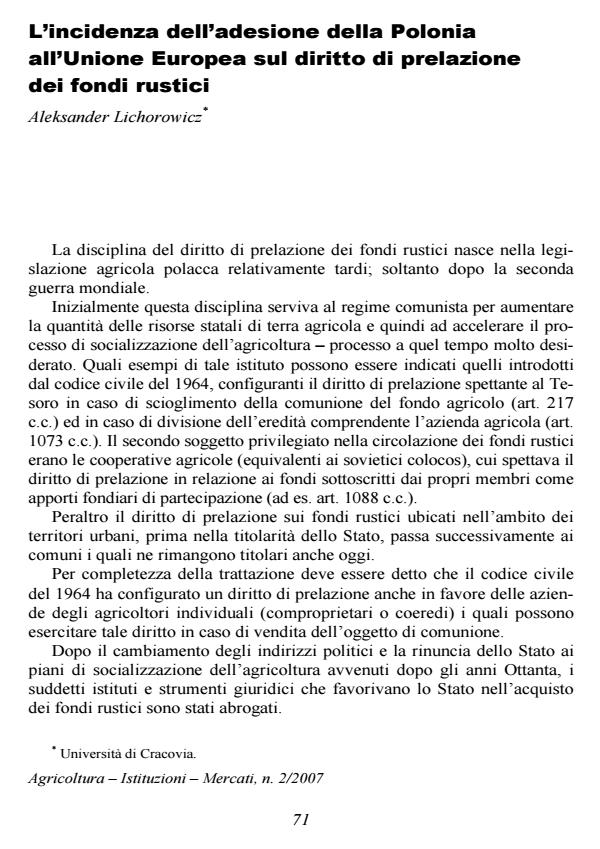L’incidenza dell’adesione della Polonia all’Unione Europea sul diritto di prelazione dei fondi rustici
Titolo Rivista AGRICOLTURA ISTITUZIONI MERCATI
Autori/Curatori Aleksander Lichorowicz
Anno di pubblicazione 2008 Fascicolo 2007/2
Lingua Italiano Numero pagine 10 P. 71-80 Dimensione file 46 KB
DOI
Il DOI è il codice a barre della proprietà intellettuale: per saperne di più
clicca qui
Qui sotto puoi vedere in anteprima la prima pagina di questo articolo.
Se questo articolo ti interessa, lo puoi acquistare (e scaricare in formato pdf) seguendo le facili indicazioni per acquistare il download credit. Acquista Download Credits per scaricare questo Articolo in formato PDF

FrancoAngeli è membro della Publishers International Linking Association, Inc (PILA)associazione indipendente e non profit per facilitare (attraverso i servizi tecnologici implementati da CrossRef.org) l’accesso degli studiosi ai contenuti digitali nelle pubblicazioni professionali e scientifiche
The particular regulation of the right of preemption of rural estates in Polish agricultural legislation appears for the first time after the Second World War. Initially, this right was vested exclusively in State (in case of liquidation of co-ownership) but in 1971 it was extended on tenants of rural estates, under the condition that they had concluded tenancy contract for three years or had effectively performed this contract for at least ten years (ex art. 695 §2 of civil code). At first all the tenants were authorized to perform this right of preemption, however in 1999 it was limited to the tenants of private rural estates. Tenants of state rural estates were provided with so-called right of priority in case of sale of an estate they held in tenancy. The right of preemption has become particularly interesting for Polish government in the course of negotiations with European Union before the final accession. It was seen as the perfect instrument to prevent an excessive acquisition of Polish rural estates by foreigners citizens of EU. That was the reason why, one year before the Accession Treaty of 16th March 2003 came in force, Polish Parliament had enacted the law of 11th April 2003 on forming of agricultural system. This law foresee right of preemption as the fundamental instrument of influence on agricultural structures. In the first order, this right is vested in the tenants of rural estates, on condition that they perform the tenancy contract for at least three years and have a special status of so-called individual farmer, conducting a family farm. In the second order so-called Rural Estates Agency, acting on account of State may exercise the right of preemption of alienated rural estate. Consistently, almost all sale contracts in Poland, which have as an object rural estate, are at moment restricted by the right of state legal preemption. The number of exceptions from this general rule is strictly limited (e.g. transactions between family members). To the main features of this institution one may include: absolute invalidity of sale contracts not respecting the right of state preemption, complete discretionality of Agency in taking decisions whether it should exercise its right or not and finally the full freedom of Agency in governing and commanding the rural estates purchased in result of exercising of the right of preemption. The above-mentioned features may call in question conformability of this institution with previsions concerning free movement of capital resulting from EC Treaty and other fundamental principles of European Law.
Aleksander Lichorowicz, L’incidenza dell’adesione della Polonia all’Unione Europea sul diritto di prelazione dei fondi rustici in "AGRICOLTURA ISTITUZIONI MERCATI " 2/2007, pp 71-80, DOI: